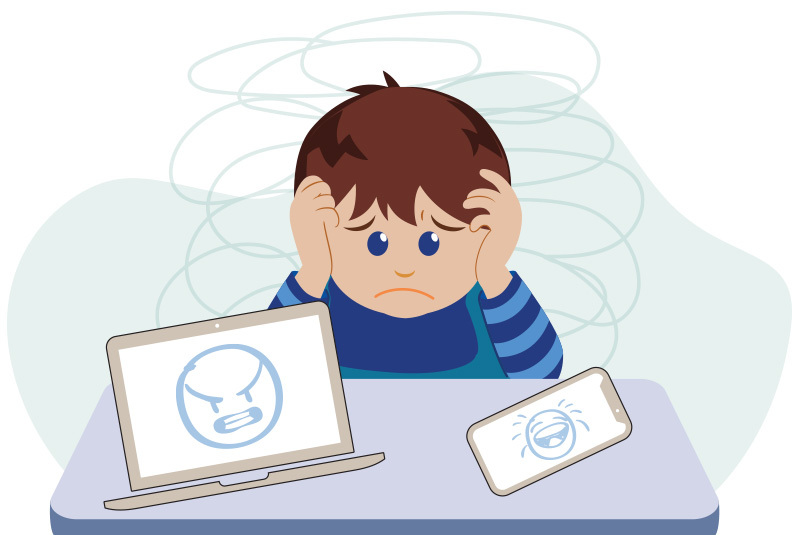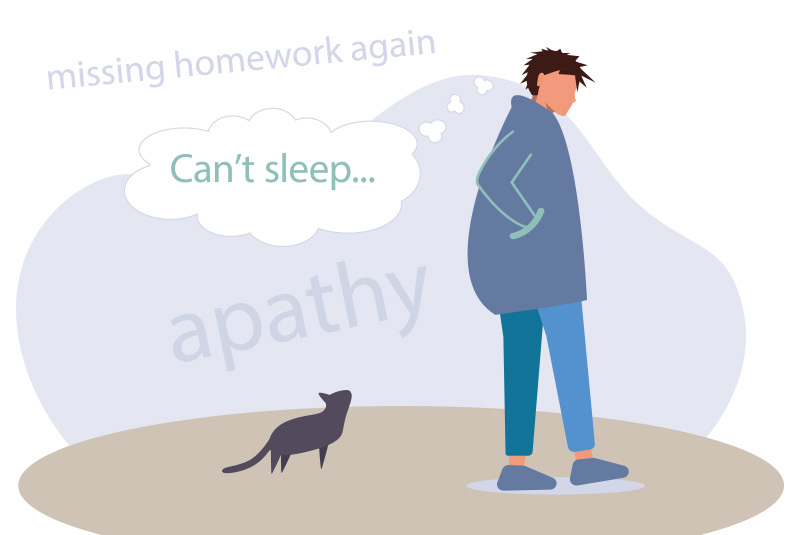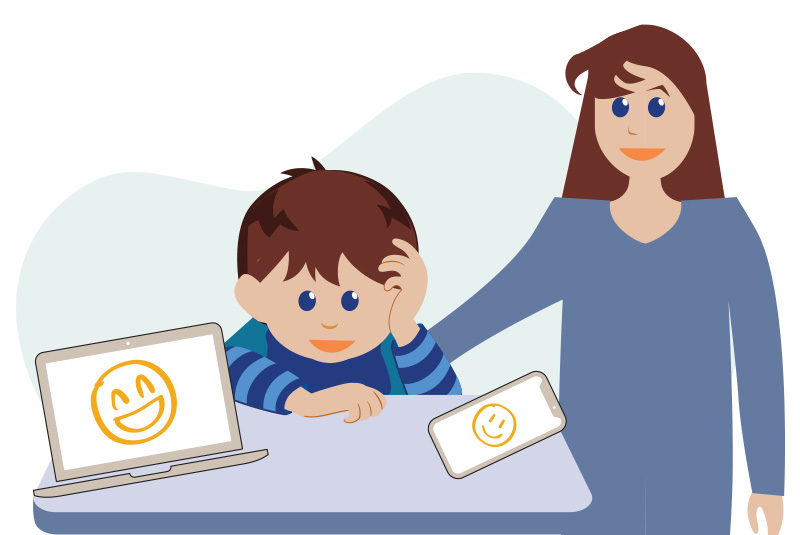Cyberbullying in the age of COVID-19: How to protect your kids

Now that so many classrooms across the country have moved totally or partially online, kids of all ages are spending a lot more time in the virtual world. And with so many kids on computers and mobile devices, there’s likely to be an increase in cyberbullying says Dr. Peter Raffalli, director of the Bullying and Cyberbullying Collaborative Clinic (BACPAC) at Boston Children’s Hospital.
“There’s been a general uptick in cyberbullying for the past several years,” says Dr. Raffalli. “And with schooling and so many other activities moved online, the numbers are likely to increase further.”
To already overburdened parents, this might feel like just one more thing to worry about during an already difficult year. For help, we turned to Dr. Raffalli to answer some common questions and concerns about cyberbullying — and what parents can do to help prevent or stop it.

How can I tell if my child is being bullied online?
Your child may not tell you they are being bullied. “Like other victims of abuse, kids don’t want to come forward, because they are afraid it will make it worse,” says Dr. Raffalli. “So many kids keep it to themselves.”
What is cyberbullying?
Cyberbullying is any type of bullying that is sent using an electronic device, such as a mobile phone, tablet, or computer. It may include sharing, sending, or posting content about someone else that is harmful, mean, or untrue. It can also include sharing private information that is humiliating or embarrassing.
He says the most telling sign that your child is being bullied is any change in behavior that signals a shift in mood or anxiety. These might include:
- apathy or lack of motivation for activities they normally like doing
- homework or grades dropping off
- changes to their sleep schedule or not being able to sleep
“While these signs may also be the result of some other problem, I tell parents to at least consider bullying if you notice any of these changes,” says Dr. Raffalli.
How can I help prevent cyberbullying?
“From an early age, try to be involved in the online life of your child,” says Dr. Raffalli. He says that when kids first get a smart phone, or their first access to social media, it should be with the stipulation that you, the parent, will be friended, have their passwords, and be able to look at conversations on their social media accounts.
If your kids are already in their teens, this tactic may not work, since older teens often will not agree to their parents being involved in their life online. Instead, Dr. Raffalli suggests having an honest talk with them. “Let your kids know they can come to you if anyone is bothering them or saying inappropriate things, and that they won’t be punished for problems online that victimize them,” says Dr. Raffalli.
He says you can also help your child build strong friendships. “The stronger a child’s friendship group, the better they are able to cope with bullying. Those who are loners or who have few friends are at greater risk for predation from other more domineering peers.”
What can I do if my child is being bullied?
“The first thing you can do is block the person who is doing the bullying,” says Dr. Raffalli. If the abuse includes threats, sexually charged comments, racist comments, or profanity, you can also report their behavior to the domain site. He says the main social media channels like Twitter, TikTok, and Instagram all have an email address where you can report abuse, typically abuse@ [the name of the domain]. For example, abuse@twitter.com or abuse@aol.com. “Any threats or violent or graphic comments should definitely be reported,” says Dr. Raffalli. “Most of these sites will ban users that engage in these behaviors.”
Is bullying happening in online classrooms?
“Yes, kids in school can steal passwords and send nasty messages within the classroom,” says Dr. Raffalli. “And when it’s on a public forum where all their classmates can see, it can be incredibly damaging.” He says that it’s not always easy for teachers to discern real bullying from normal quarrels. But if your child is being bullied in class, speak with their teacher. And if you don’t get the response you want, take it to the school administration.
Is cyberbullying really that harmful?
Yes. “Bullying of any type is considered an adverse childhood event,” says Dr. Raffalli. “And we know that events like this that go on over time without adequate adult intervention can turn into toxic stress.” He says cyberbullying not only affects a child’s mental health, but also physical health. “Kids who are bulled have an increased risk for many health issues; that risk lasts into adulthood. Bullying has also been linked to depression and can be a trigger for suicidality.”

What else can I do to help my kids?
Dr. Raffalli offers a few tips for trying to prevent cyberbullying:
- Try to help your child build resiliency and self-esteem from an early age. “One way to do this is to get them involved in hobbies or other extracurricular activities that they enjoy and are good at.,” he says.
- If your school system doesn’t have a social-emotional curriculum, go through the PTA and try to advocate for this type of curriculum. “This curriculum teaches kids that a lot of really smart and famous adults were bullied, and helps them to understand that the mean things other people may say to you are not valid. It raises awareness and empathy for others.”
- Be proactive. “Warn your child that kids might be mean online and it’s not OK. Let them know to tell you and that you don’t want to see them hurt.”
Learn more about BACPAC and Boston Children’s response to COVID-19.
Related Posts :
-

Model enables study of age-specific responses to COVID mRNA vaccines in a dish
mRNA vaccines clearly saved lives during the COVID-19 pandemic, but several studies suggest that older people had a somewhat reduced ...
-

New insight into the effects of PPIs in children
Proton-pump inhibitors (PPIs) are frequently prescribed to suppress stomach acid in patients with gastroesophageal reflux disease (GERD). Prescribing rates of ...
-

Creating the next generation of mRNA vaccines
During the COVID-19 pandemic, mRNA vaccines came to the rescue, developed in record time and saving lives worldwide. Researchers in ...
-

Reversing the trend: Easing the mental health boarding crisis in emergency rooms
Anxiety, depression, and suicide attempts have been rising over the past decade, especially among teens, often landing them in emergency ...





